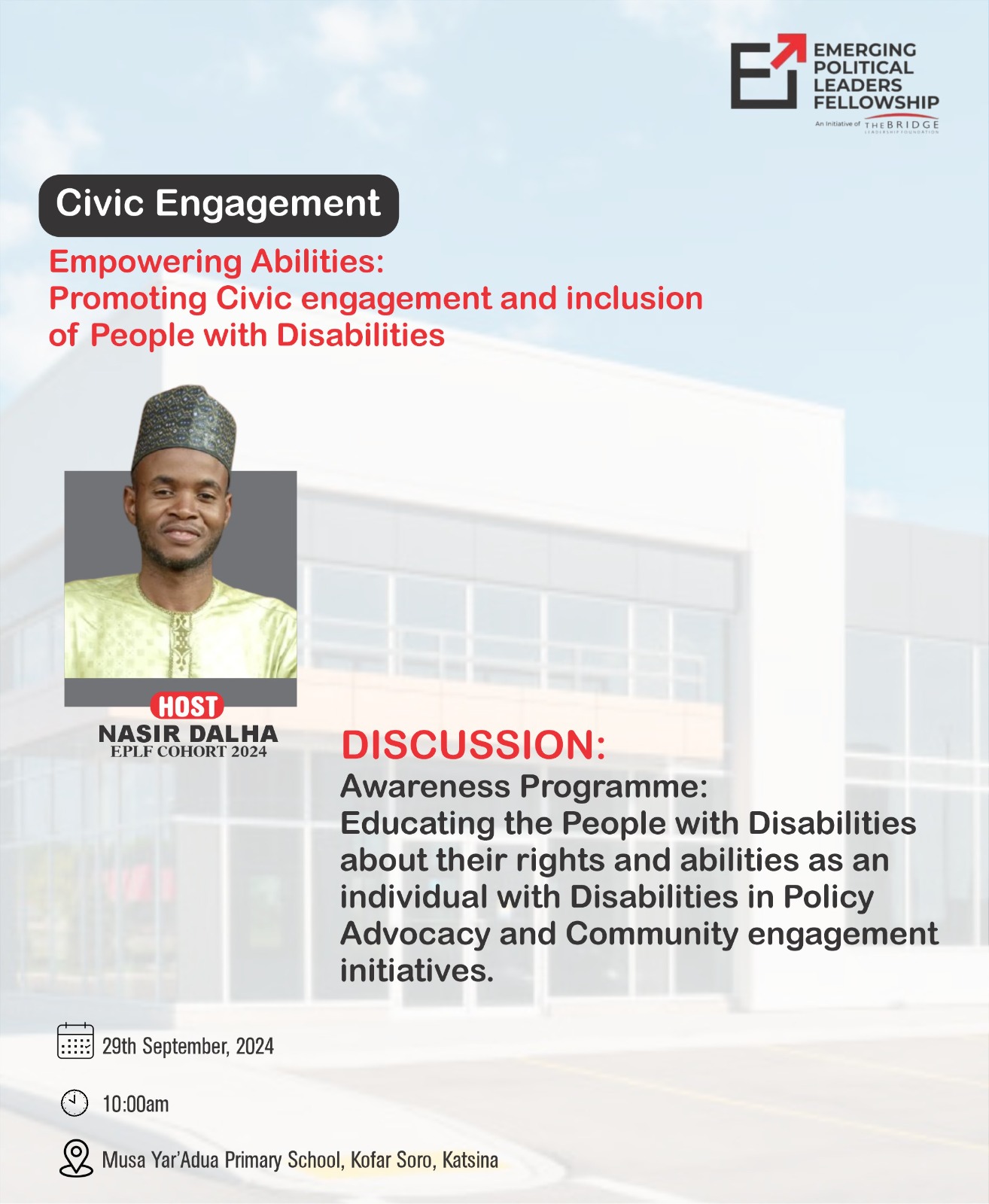In line with his dedication to fostering inclusion and promoting civic engagement, Nasir organized an activity titled “Empowering Abilities: Promotion of Civic Engagement and Inclusion of People with Disabilities in Katsina State.” This initiative, part of the Emerging Political Leaders Fellowship (EPLF) 2024 cohort, aimed to raise awareness about the civic rights and responsibilities of People with Disabilities (PWDs) while promoting their active participation in policy advocacy and community engagement.
Core Objectives
The primary objectives of my civic engagement initiative were:
- Raise Awareness About Civic Rights and Responsibilities: The event aimed to educate PWDs about their civic rights, encouraging them to engage actively in community and national development. By understanding their rights, participants can make informed decisions and fully participate in societal activities.
- Foster an Inclusive Community Environment: Central to this initiative was the commitment to creating a community where PWDs feel welcomed, valued, and have equal opportunities to contribute.
- Empower Individuals with Disabilities to Advocate for Their Rights: A key goal was to equip PWDs with the tools and knowledge to advocate effectively for their rights, including how to engage with policymakers and influence decisions that affect their lives.
- Promote Civic Engagement Among PWDs: The initiative encouraged PWDs to take active roles in their communities by engaging in civic activities, including local governance and community initiatives.
Key Outcomes
The event took place on September 29, 2024, at Musa Yar’adua Primary School in Kofar Soro, Katsina, with a targeted turnout of 20 PWDs, consisting of both men and women. The session commenced at 10 AM and lasted for four hours, allowing participants to engage in meaningful discussions about their civic rights, responsibilities, and how they can influence policy changes that impact their lives.
To maintain high energy and engagement levels, refreshments, including mineral drinks and bottled water, were provided, along with transportation fare to facilitate participants’ return home. Attendees expressed their gratitude for the opportunity to engage in a session that addressed their needs and aspirations.
The session revolved around the theme “Awareness Programme: Educating People with Disabilities about Their Rights and Abilities.” Key discussion topics included:
- Understanding Civic Rights and Responsibilities: Participants learned about their fundamental civic rights, such as voting, accessing public services, and engaging in community activities.
- Policy Advocacy and Engagement: The importance of advocating for inclusive policies that reflect the needs of PWDs was emphasized. Examples of successful advocacy efforts from other regions were shared to inspire local action.
- Overcoming Barriers to Inclusion: Discussions highlighted the social, physical, and institutional barriers that PWDs face in Katsina State. Together, participants brainstormed solutions to address these challenges.
Expected Key Outcomes
From this civic engagement activity, we anticipated the following outcomes:
- Increased Civic Awareness: Participants were expected to develop a greater awareness of their civic rights and responsibilities, enabling them to engage more fully in societal affairs.
- Empowered Advocates for Change: Equipped with knowledge of their rights and advocacy tools, participants would be better positioned to engage with policymakers and demand inclusive policies that address their specific needs.
- Enhanced Community Engagement: By fostering a sense of belonging, the event aimed to inspire PWDs to become active contributors to community development initiatives in Katsina State.
- Promotion of Gender-Inclusive Discussions: The mixed-gender participation ensured that both male and female PWDs could share their experiences and perspectives, promoting a more inclusive approach to community engagement.
Way Forward and Recommendations
The event underscored the necessity for sustained efforts to promote the inclusion of PWDs in civic activities. Moving forward, we recommend the following:
Continuous Advocacy for Inclusive Policies: Ongoing advocacy is essential to ensure that policies at the state and local levels reflect the rights and needs of PWDs. Engaging local governments, policymakers, and civil society organizations is crucial for driving long-term change.
Integrating Civic Education into Schools and Vocational Centers for PWDs: Civic education should be included in the curricula of institutions catering to PWDs to equip future generations with the knowledge they need to become active citizens.
Collaboration with Government and NGOs: Partnerships with organizations such as the National Commission for Persons with Disabilities (NCPWD) and NGOs focused on disability advocacy are vital for scaling up the impact of similar initiatives.
Regular Civic Engagement Workshops: Periodic workshops and forums should be held to continually engage PWDs in discussions about their rights, responsibilities, and contributions to national development.
Conclusion
The “Empowering Abilities: Promotion of Civic Engagement and Inclusion of People with Disabilities in Katsina State” initiative marked the beginning of a critical conversation about the inclusion of PWDs in civic life. By educating and empowering this marginalized group, we are nurturing a society that is not only inclusive but also enriched by the diverse voices of all its members. This initiative will continue to evolve as more PWDs embrace advocacy and civic engagement, contributing to the development of a more inclusive and participatory Katsina State.

